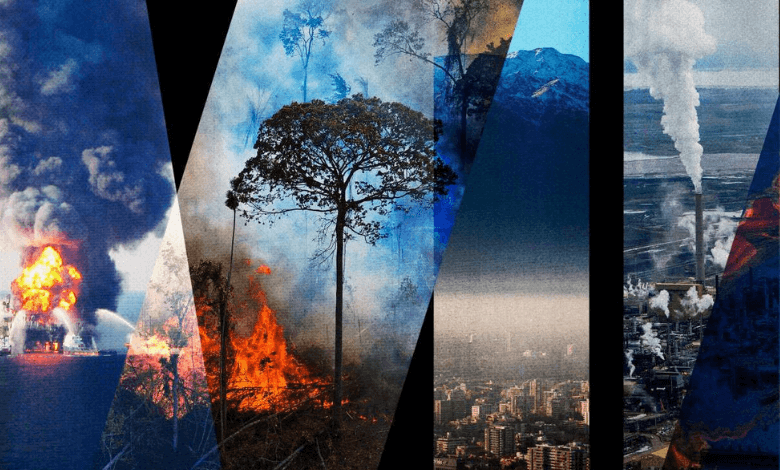Climate Change is Fueling Conflicts and War Crimes

As we delve into this issue, we’ll explore how climate change contributes to conflicts, exacerbates existing tensions, and, in some instances, leads to war crimes. It’s crucial to understand these connections!
The Intersection of Climate Change and Conflict
Before we delve into the connection between climate change and conflict, it’s essential to grasp some fundamental facts about our warming world. The Earth’s temperature is rising, primarily due to human activities. This increase in temperature leads to various consequences, including more frequent and severe weather events, rising sea levels, and altered rainfall patterns.
These changes in the Earth’s climate can impact regions differently. Some areas experience more prolonged droughts, while others face more extreme rainfall. These alterations can disrupt ecosystems and economies, leading to resource scarcity, food insecurity, and increased competition for essential resources.
Now, let’s look at how this climate-induced upheaval contributes to conflicts and war crimes:
Resource Scarcity:
One of the most direct consequences of climate change is resource scarcity. Droughts can devastate agricultural lands, making it challenging for communities to grow food. Rising sea levels can contaminate freshwater sources, leaving people without access to clean drinking water. Such scarcities often lead to competition, disputes, and even violence among communities and nations struggling to meet their basic needs.
Forced Migration:
Climate change-related impacts like extreme weather events and sea-level rise can displace communities. When people are forced to leave their homes due to climate-related reasons, it can strain already crowded regions, leading to increased tensions and conflicts over housing, jobs, and services.
Food Insecurity:
As climate change affects agriculture, it can lead to food insecurity. When people are unable to feed themselves and their families, desperation can set in. Food riots and conflicts over access to resources are more likely in situations where people don’t have enough to eat.
Exacerbating Existing Conflicts:
Climate change can also exacerbate existing conflicts. For example, in regions with ongoing tensions or disputes over resources, the added pressure of climate-related scarcity can intensify conflicts and make them more difficult to resolve. In some cases, climate-induced resource scarcity can even be a “threat multiplier,” amplifying existing conflicts.
The connection between climate change and war crimes isn’t always straightforward let’s understand this with me.
For example, when people are displaced due to climate-related factors and become refugees, they may live in overcrowded camps with limited access to resources. Under these circumstances, human rights abuses and crimes may occur, such as sexual violence, child military recruitment, and forced labor.
I will explain this concept to you by using some specific examples:
1. Syria: The civil war in Syria began in 2011 and was caused by a number of things, such as political and social unrest. A severe drought that hit the area from 2007 to 2010 did, however, play a big part in starting the conflict. Because of the drought, a lot of families from the country had to move to cities, where they had trouble finding food and water and didn’t have many job opportunities. This made things even less stable than they were before.2. Sudan and Darfur: The conflict in Darfur is another case of how climate change can make things more violent. The conflict has deep political and racial roots, but it is made worse by a lack of resources. Nomadic herders had to move onto farmlands in the early 2000s because of a long drought. These problems made it easier for violence to start in the area.
3. Yemen: This country has one of the least amounts of water in the world. The country has had political unrest and conflict for a long time, but the lack of water, which is partly caused by changes in rainfall patterns, has made things even worse. For many Yemenis, life is very hard because they can’t get clean water or land to farm.
Hence it shows that climate change can intersect with other political, social, and economic factors to create conditions ripe for conflicts and war crimes.
Read More: 2023 Climate Action Report: The Road Ahead for the Energy Union
The connection between climate change and conflict requires a multi-faceted approach. Here I am suggesting some steps that we can take to mitigate the impacts of climate change and reduce violence:
1. Mitigation: Greenhouse gas reduction is essential. This requires using clean energy, sustainable agriculture, and preserving forests and other climate-regulating ecosystems.
2. Adaptation: We must adapt to climate change. Create resilient communities, protect resources, and build climate-resilient infrastructure.
3. Conflict Prevention: Governments and international organizations should invest in conflict prevention strategies to reduce violence, even under climate change pressures.
4. Global Cooperation: Climate change requires international cooperation. This includes reducing emissions and helping vulnerable regions adapt to changes.
To prevent any bad , We need to understand the link between climate change, conflict, and war crimes as soon as possible because geopolitics is changing so quickly right now. We can hope to lessen some of the worst effects of climate change and work towards a safer and more peaceful future for everyone if we deal with these problems in their entirety.


